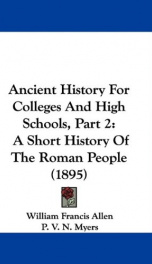essays and monographs

Purchase of this book includes free trial access to www.million-books.com where you can read more than a million books for free. This is an OCR edition with typos. Excerpt from book: RELIGION OF THE ANCIENT ROMANS. The " Mythology of the Greeks and Romans," as it has heretofore been taught in our school-books and used as material in modern literature, is in truth neither Greek mythology nor Roman mythology, but an incongruous mixture of the two Grecian fable with Roman nomenclature. So long as it was purely a matter of fancy and of literary concern, there was no great harm done. Every, body understood what was meant by the Olympian Jove, the Eleusinian worship of Ceres, and the temple of Diana of the Ephesians, better, indeed, than if we had said Zeus, Demeter, and Artemis. But with the present century has come in a new school of philology, which has abandoned the merely literary treatment of such themes for one rigidly scientific, and which has discovered that names are not an indifferent matter in science; in fact, that in such a field of inquiry as this the name is often the key to the entire investigation. Max Muller, indeed, the leading authority in this new school, asserts "that mythology is simply a phase in the growth of language," an assertion in which we may recognize an important truth under an exaggerated form of statement. Perhaps there was a little pedantry in the first zeal for calling the Greek divinities by their right names; but it was at bottom a genuine, if blind and pedantic, striving for scientific accuracy. And now that Comparative Mythology has come up as a science, we can see that one of its first and most essential requirements was to distinguish with precision between the religious systems of these two related peoples, and that the first step towards this was to use names rightly. So long as Poseidon was called Neptune, andAres, Mars, the foundations of the new science could not be laid. From The North American Rtvirw, vol. ...
Info about the book
Author:
Series:
Unknown
ISBN:
0262517485
Rating:
4/5 (2)Your rating:
0/5
Languge:
English
Users who have this book
Users who want this book
What readers are saying
What do you think? Write your own comment on this book!
write a commentif you like essays and monographs try:
Do you want to read a book that interests you? It’s EASY!
Create an account and send a request for reading to other users on the Webpage of the book!




